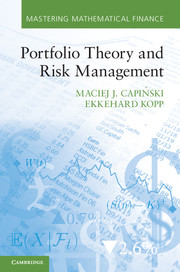8 - Coherent measures of risk
Published online by Cambridge University Press: 05 May 2015
Summary
In the previous chapter Value at Risk was shown to have two potentially undesirable features:
• VaR provides no information on the size of potential losses in scenarios with probability less than α.
• VaR recorded for a diversified position may exceed that recorded for a position with all funds held in one security.
On the other hand, VaR has the advantage of simplicity: it produces a single number to quantify the risk of holding a given risky position. However, it does this by taking account only of the α-quantile, rather than of the whole distribution.
While VaR has retained much of its popularity with practitioners, many observers have commented that the 2007/8 banking crisis revealed that financial markets can be unduly optimistic in their evaluations of risk. This chapter takes its title from a seminal paper by Artzner, Delbaen, Eber and Heath in 1999, which highlighted the defects of VaR and proceeded to set out, as axioms, four algebraic properties for risk measures to be coherent, as well describing a wide class of such measures. This approach has since won many adherents and spawned a very considerable research literature, including further generalisations.
- Type
- Chapter
- Information
- Portfolio Theory and Risk Management , pp. 124 - 158Publisher: Cambridge University PressPrint publication year: 2014

